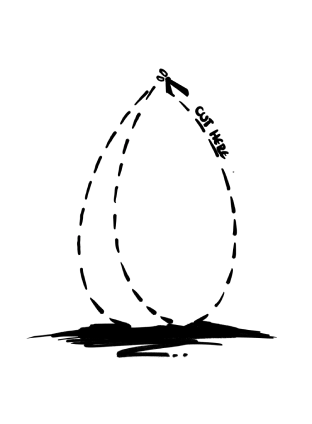As recreational cannabis laws change rapidly across the U.S., breweries are using their existing infrastructure and experience to create drinks with a different buzz.
The Boston Beer Company’s name undersells its boundless desire for beverage creation of all stripes. Jim Koch introduced Samuel Adams Boston Lager in 1984, and the company has since expanded to include Twisted Tea, Truly hard seltzer (and vodka), and Angry Orchard hard cider, not to mention its 2019 merger with Dogfish Head.
Taking a leap into a new imbibing frontier is another day at the office—which is where Paul Weaver, Boston Beer’s head of cannabis, comes in. “Cannabis legalization in America seems like it has some level of inevitability,” he says. “So then it was a question of, ‘What’s the right way to enter that space?’”
One of the company’s best-selling alcoholic brands is Twisted Tea hard iced tea, and Weaver spotted a similar opportunity for innovation with THC-infused beverages. This summer, Boston Beer introduced its TeaPot cannabis-infused iced teas in Canada, which federally legalized recreational use of cannabis in 2018. The first release, the uncarbonated Good Day Iced Tea, features a moderate five milligrams of THC and tastes of lemon black tea, not weed. “We have this expertise on how to make a great tasting iced tea in our back pocket,” says Weaver.
Like a steadily falling domino chain, states are legalizing the recreational use of cannabis. This is opening new sales channels for all kinds of cannabis products, some inhaled, some consumed, and others sipped like seltzers with a psychoactive not-so-secret ingredient.
While smokable flowers (or buds), edibles, and vapes lead legal sales, there’s a newfound thirst for THC-infused beverages. For now, they account for slightly more than one percent of total cannabis sales, but “beverages are growing and trending up,” says Cooper Ashley, a senior data analyst for Headset, a market intelligence firm in the cannabis sector. “The category has gotten more sophisticated.”
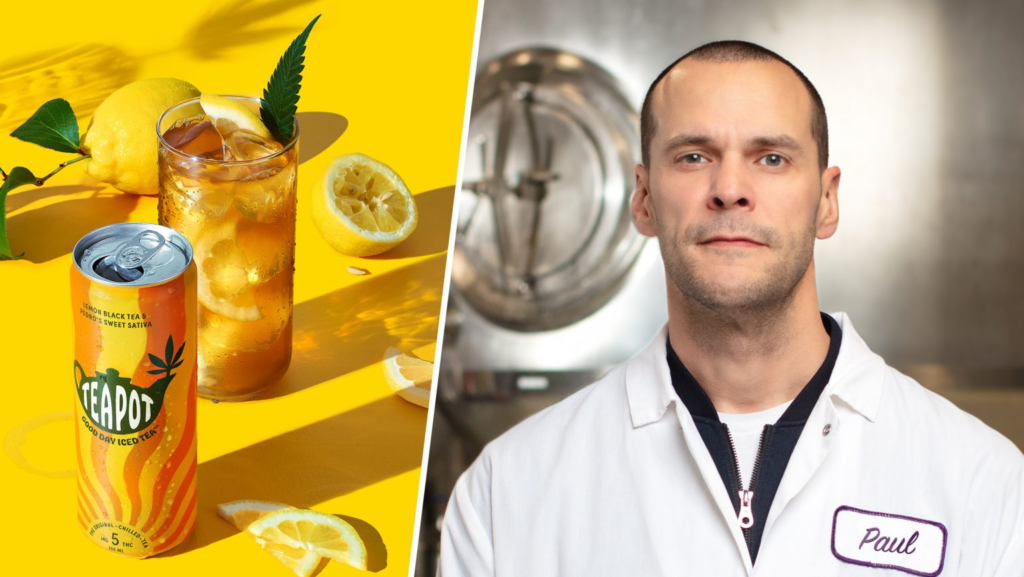
As laws evolve, spirits and wine brands are beginning to produce cannabis beverages, but the most innovation and movement in this space is coming from breweries. Their nimble ability to create high-quality canned beverages is translating to the development of compelling THC-infused seltzers, nonalcoholic beers, and more. From large breweries such as Lagunitas to local players such as Modist in Minneapolis, more and more breweries across the nation are swiftly capitalizing on this unique vantage point and moving into the THC-infused beverage space.
Audience and Flavor Crossover
The kinship between cannabis and beer is intertwined in agriculture. Cannabis and hops belong to the Cannabaceae plant family and share pungent flavors and aromas, leading some double IPAs to smell as dank as a dispensary.
Lagunitas has long been associated with cannabis, once calling a copper ale The Kronik and getting temporarily shut down in 2005 following an undercover investigation. “They thought we were selling weed,” says chief marketing officer Paige Guzman.
Fans of Lagunitas likely share the company’s cannabis sympathies, making them a prime audience for THC beverages. After California legalized recreational cannabis in 2016, the Petaluma, California, brewery (now owned by Heineken International) partnered with cannabis maker CannaCraft on the THC-infused Hi-Fi Hops seltzers. The seltzers were released in 2018 and sold in 12-ounce amber glass bottles, but “people thought it was a beer,” says Guzman.
This year, Lagunitas revamped the line as Hi-Fi Sessions, switching to sleek cans and new flavor profiles developed by Lagunitas brewmaster Jeremy Marshall, who works closely with CannaCraft. The products come in three strengths, from Hoppy Chill, a mix of hops and cannabis with 10 milligrams of THC, to the lighter Cloudberry, which features two milligrams of both THC and CBD.
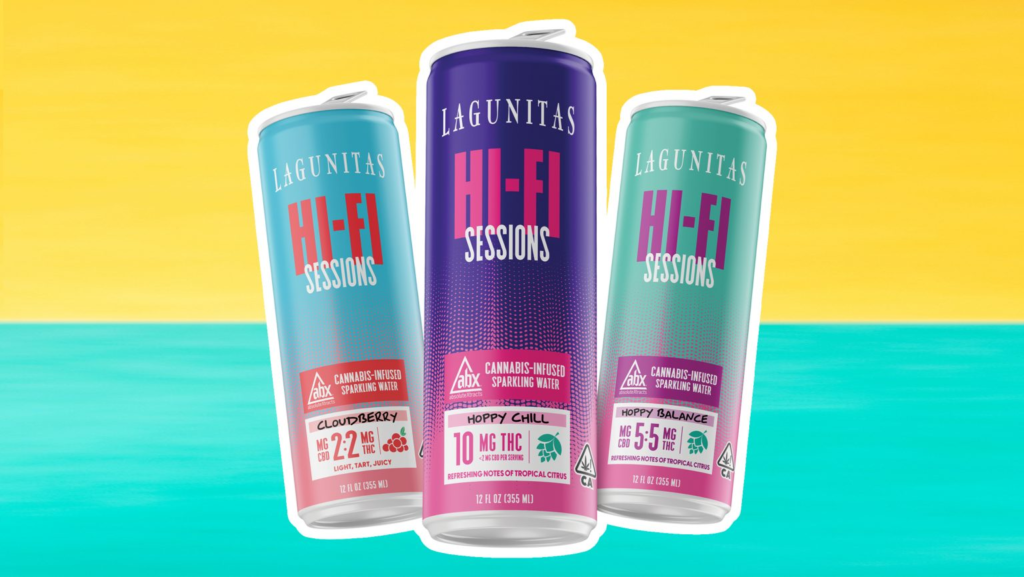
“We want to signal that we have products that are sessionable,” says Guzman. It’s a similar approach to their beers, such as the DayTime IPA, which is 4% ABV. “We’re taking a page out of what we do in beverage alcohol.”
Beer is historically a beverage of moderation; the ABVs of lagers are generally in the range of 4 to 5%. Similarly, many breweries are keeping the THC levels of cannabis beverages low enough to sip several without getting stoned.
“We’re about social consumption,” says Weaver, “not the fastest way to get as high as possible.”
Microdosing Meets Breweries
On July 1, the Minnesota legislature legalized the sale of products containing hemp-derived THC. The law stipulates that nothing can contain more than five milligrams of THC per serving, leading breweries to experiment with microdosing.
In August, Indeed Brewing of Minneapolis unveiled Two Good Sparkling THC, flavored with lavender and lemon peel and featuring two milligrams of THC and CBD from Superior Molecular, which creates water-soluble versions of the compounds. “It’s a place for people to start to experiment,” says Indeed Brewing CEO and cofounder Tom Whisenand.
Typically, cannabis products and alcoholic beverages can’t be produced or served in the same setting. But Minnesota’s recent law change painted a legal gray area, and many Minnesota breweries are now making and selling THC beverages beneath the same roof.
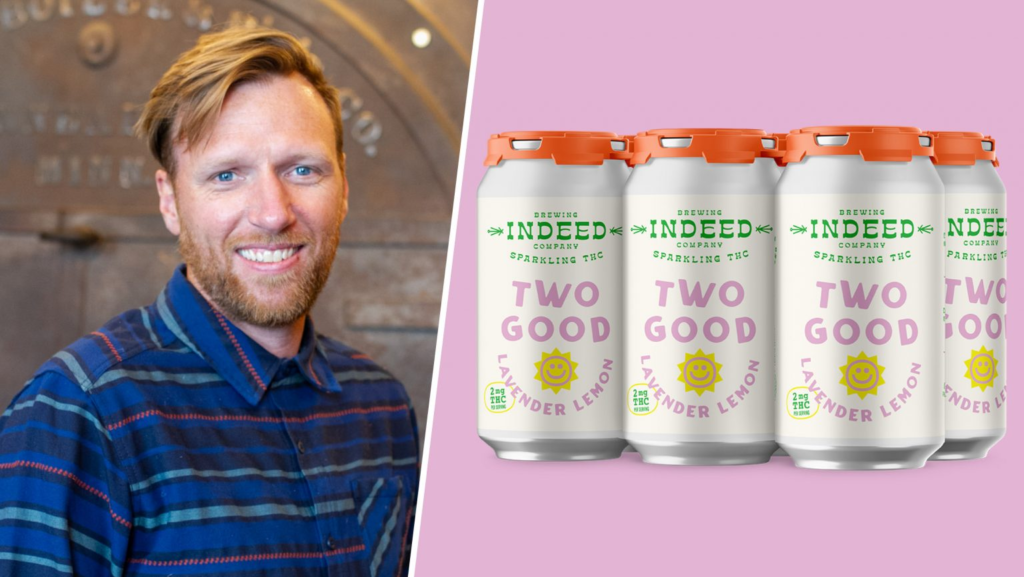
With the ability to produce big and small batch sizes, a hyper-focus on precise measurements, and the competency to create everything from fruited hard seltzers to pilsner and pastry stouts, breweries are “uniquely positioned for this,” says John Donnelly, the head of sales and a cofounder of Modist. In August, the brewery began making and selling 16-ounce cans of fruit-infused TINT (an acronym for Thanks, I Needed That) seltzers in mango-passionfruit and blackberry-lime. Each can includes three milligrams of THC, a dose that’s almost like a “pilsner equivalent,” says Donnelly.
Demand is strong. When staff arrives in the morning and turns on the computer to process online orders for pickup, tickets quickly stack up for TINT. According to taproom staff, new customers are “coming in and only drinking TINT,” says Donnelly. “There’s a lot of people that don’t drink, so this is a nice way to open our doors for everybody.” Donnelly adds that employees only sell TINT to customers that are 21 and up—just like alcohol.
Building Brand Awareness
Matt Vincent has been involved in beer since the late 1990s, serving as the first head brewer of Ska Brewing (he’s now a co-owner and vice president) and later founding equipment manufacturer Ska Fabricating, both based in Durango, Colorado. In 2018, he cofounded Oh Hi Beverages to produce THC-infused seltzers.
“People like drinking and now you can drink your weed,” says Vincent of the sales proposition. But four years in, “getting people to go to a dispensary has been a challenge.”
To increase awareness, Oh Hi later released a CBD-only version sold in 14 states. The idea is to make the brand recognizable for curious customers to “dip their toes into cannabis beverages,” says Vincent.
Earlier this year, Bale Breaker Brewing in Yakima, Washington, launched the canned Sungaze Cannabis Seltzer that features 2.5 milligrams of THC. To spread the word about low-potency Sungaze, sold in flavors such as lemon ginger, Bale Breaker has sponsored concerts and served cocktails made with uninfused Sungaze—taking a leaf straight out of the beer-marketing playbook. Give folks a sample, and you might have a future sale.
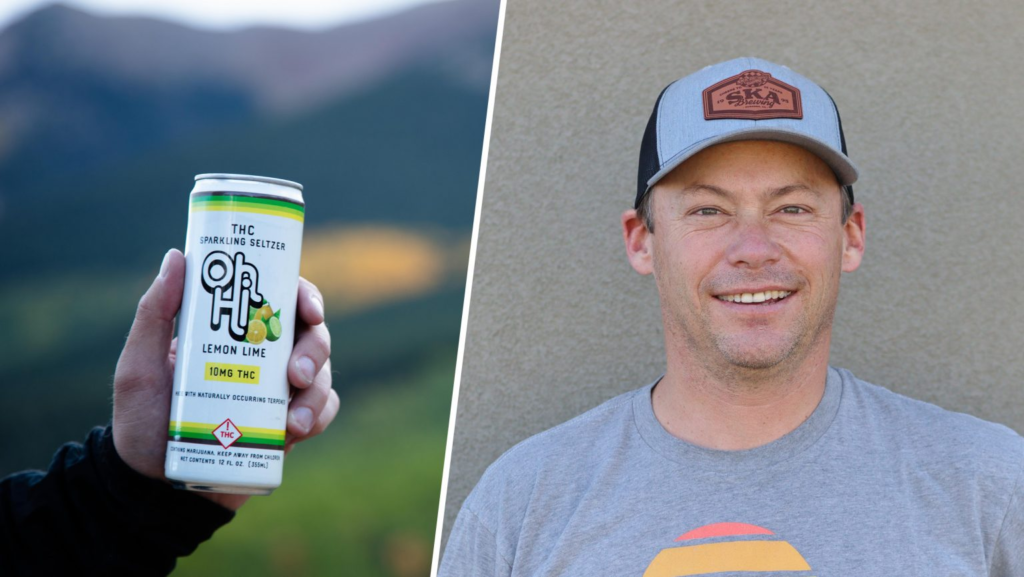
“That was a way to get Sungaze in front of people and be like, ‘If you like the way this tastes, you can go to a dispensary and get it infused,’” says Kevin Smith, Bale Breaker’s co-owner and brewmaster.
For cannabis beverage companies, it’s smart business to have products ready for any market. Legally, nonalcoholic beers can contain up to 0.5% ABV, but mixing THC with any alcohol could be problematic. This June, Ceria Brewing retooled its THC-infused beers, including Indiewave IPA and Grainwave Belgian-style white ale, to eliminate all alcohol.
“We’re ready for any state and even federal decriminalization,” says cofounder and brewmaster Keith Villa.
Ongoing law changes remain a challenge, but so is changing the behavior of cannabis consumers, both old and new. For breweries, getting customers to swap puffs for pints of THC-infused beverages will take time, education, and trial and error. “Just like there’s not one beer for everyone, there’s not one cannabis drink for every customer,” says Ashley.
Source: Daily sevenfifty

